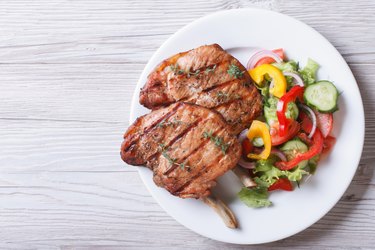Trying to keep track of the latest-and-greatest "best" diet for weight loss would be a dizzying — and dangerous — undertaking: One week you'd be noshing like a Viking on the Nordic diet, and the next you'd be interval fasting like Dubrow diet devotees.
It's hard enough just staying on top of weight-loss trends, much less trying to make sense of which diets are legit and will actually help you shed pounds — and keep them off.
That's where our guide comes in, covering everything from the popular plans with science-backed results to the fads you should stay far, far away from.
Ready to Lose Weight?
Set yourself up for success with more from our 30-Day Weight-Loss Kickstart.
What to Look for in a Weight-Loss Diet
Because each person is unique, there's no one diet that works best for everyone. And even if someone you know saw amazing results from a diet plan, that doesn't mean the same approach will work for you.
But, according to the Mayo Clinic, there are a few key features that all successful — and safe — diets share. Before you invest your time and energy in a new way of eating, ask yourself these questions:
1. Is It Balanced?
Even when you're trying to shed pounds, your diet should still include a balance of the nutrients your body needs, including adequate amounts of healthy proteins, carbohydrates and fats (think: fruits, vegetables, whole grains, low-fat dairy, lean meats). If the diet cuts out an entire food group or has you taking large amounts of vitamins or supplements, it's a red flag.
2. Is It Flexible?
While a healthy diet should limit empty-calorie picks like alcohol and sugary foods and drinks, it should never be so rigid that it doesn't allow for the occasional indulgence. Indeed, a study published in the 2018 issue of the Journal of Nutrition in Gerontology and Geriatrics found that a flexible approach to eating led to better intentional weight loss for older women who had overweight and obesity.
3. Do I Like the Foods Included?
Maybe you could tolerate certain foods for a short period of time, but you're much more likely to stick with a diet (and achieve long-term weight loss) if you're enjoying what you're eating on a regular basis.
4. Does It Encourage Exercise, Too?
Along with a balanced diet, physical activity is part of a healthy lifestyle. It can boost your weight-loss efforts, sure, but it also offers a host of other benefits for your physical and mental health. Regular exercise lowers your risk for heart disease, type 2 diabetes, obesity and some cancers, and it can also improve your cognitive function, according to the Centers for Disease Control and Prevention.
Warning
Before you begin any new diet or exercise plan, be sure to talk to your doctor, who will help you choose the safest approach based on your health history and current medications.
What You Should Know About Keto

The ketogenic or keto diet has been the hottest trend in the weight-loss world for a while. The high-fat, very-low-carb approach is touted as a quick way to get trim while still enjoying highly satiating foods. The key lies in inducing ketosis, which encourages your body to burn fat for energy rather than sugar (which comes mostly from carbohydrate foods).
Despite its widespread popularity, though, there are some disadvantages to the diet, including its rigid approach and the potential side effects of ketosis.
Here's what to know about keto, and how to determine if the diet is right for you.
What's the Deal With Intermittent Fasting?

Fasting is nothing new, but intermittent fasting is a trendy approach to dieting that's been popularized by celebs from Chris Pratt to Jennifer Lopez. So what is it, exactly?
Followers of intermittent fasting don't count calories or macros. Instead, they simply schedule their eating into specific timeframes. There are several different approaches, including the 5:2 diet, which has you eat normally five days of the week and then only consume about 500 calories the other two days. There's also the 16:8 approach, in which you abstain from food for 16-hour periods each day, then eat your typical meals during the other eight hours.
Get the full details on intermittent fasting for weight loss, including the reason some skeptics don't buy the hype.
The Lowdown on the Whole30 Diet

The Whole30 diet, which first became popular in 2009, is a type of elimination diet that encourages followers to fill up on whole, unprocessed foods from quality sources. What sets this diet apart from most others is the strict timeframe: As the name indicates, it's only meant to be followed for 30 days.
While the diet does eliminate certain food groups — which is typically a red flag signaling an unhealthy approach — it does so only for the monthlong period. And while a secondary goal is weight loss, the broader aim is to help you better understand which foods work best for your overall wellness goals.
Here's everything you need to know before you try the Whole30 diet.
All About Paleo

Also known as the "caveman diet," the paleo approach is all about eating whole foods from plants and animals and avoiding anything processed. Sounds healthy, right? But some critics say the diet is a bit too restrictive because it nixes the nutrients you'd normally get from calcium-rich dairy and fiber-packed whole grains.
Plus, there's not a ton of scientific evidence to show that the diet helps with weight loss. And there are different schools of thought when it comes to the "right" way to go paleo.
Learn all about the benefits and drawbacks of the Stone Age-inspired diet before you decide if it's a smart move.
What About Fad Diets?

With so many diets out there promising quick weight loss and other believe-it-or-not results, it can be tough to parse the real ones from the fads, i.e. those that underdeliver or, even worse, end up doing more harm than good.
Luckily, there are a few ways to tell if an eating plan is legit or totally not worth your time and effort (we're looking at you, grapefruit diet).
Check out our tell-all on fad diets, including a foolproof guide to help you spot problematic plans.
